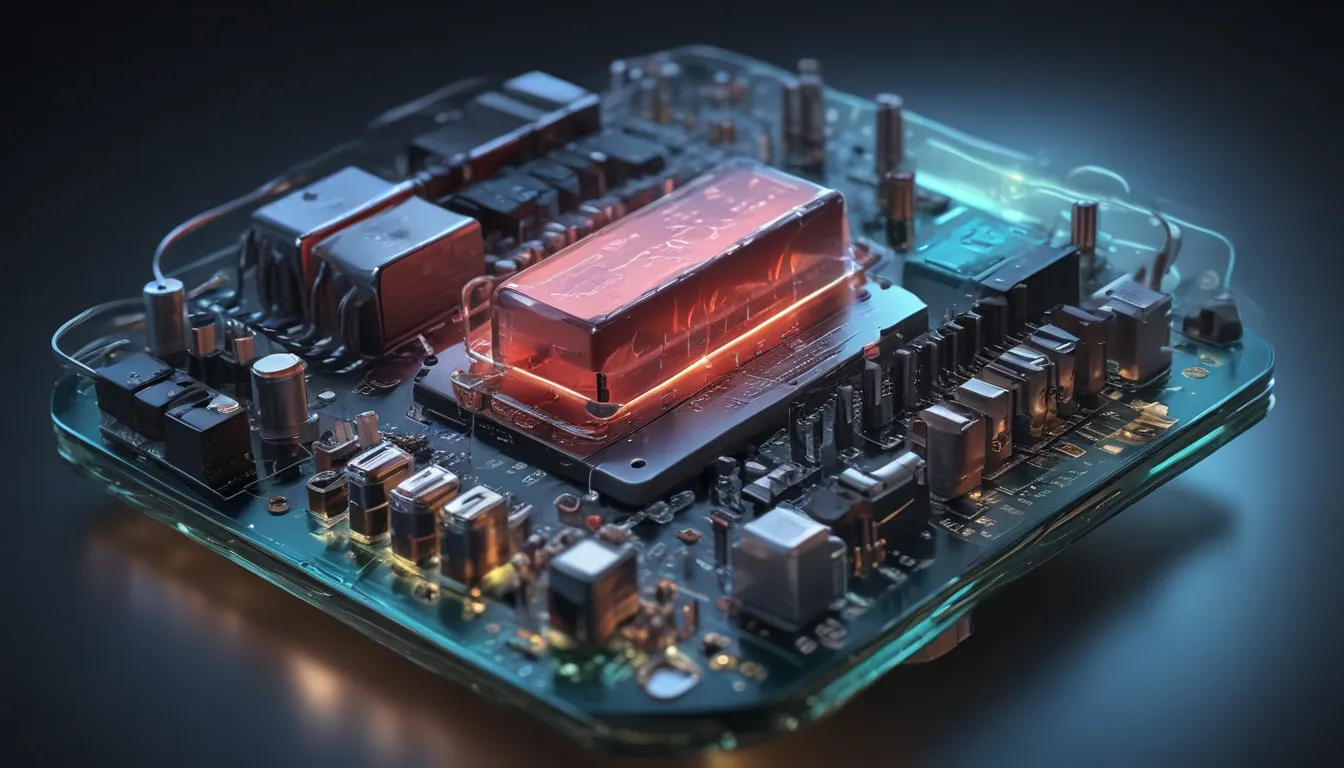A Note About Images: The images used in our articles are for illustration purposes only and may not exactly match the content. They are meant to engage readers, but the text should be relied upon for accurate information.
In the realm of science, electrolytic cells stand as captivating devices that have revolutionized the landscape of chemistry. These remarkable cells utilize electrical energy to drive non-spontaneous chemical reactions, paving the way for innovative applications across various industries. Whether you are a chemistry enthusiast or simply curious about the intricate world of molecular interactions, exploring the wonders of electrolytic cells is bound to leave you in awe.
Key Takeaways:
- Electrolytic cells harness electricity to catalyze chemical reactions, playing a pivotal role in diverse processes such as electroplating, metal extraction, and environmental restoration.
- These versatile devices are instrumental in shaping modern scientific research and industrial practices, showcasing their significance in our ever-evolving world.
Unraveling the Essence of Electrolytic Cells
An electrolytic cell is a sophisticated contraption that relies on external electrical energy to prompt chemical transformations that would not occur spontaneously. As opposed to galvanic cells, which generate electricity from spontaneous reactions, electrolytic cells serve as the driving force behind a spectrum of pivotal applications.
The Marvels of Electroplating
A prominent use of electrolytic cells lies in the electroplating process, wherein a thin layer of metal is deposited onto a surface to enhance its visual appeal or fortify it against corrosion. This technique has found widespread application across various industries, showcasing the versatility of electrolytic cells.
Empowering Clean Energy: Splitting Water Molecules
Harnessing the power of electrolytic cells, researchers have unlocked the ability to split water molecules into hydrogen and oxygen gases through a process known as electrolysis. This groundbreaking advancement holds the key to developing sustainable energy sources that could shape the future of clean fuel production.
Aluminum Production: A Showcase of Electrolytic Excellence
The manufacturing of aluminum stands as a testament to the prowess of electrolytic cells, with large-scale operations utilizing these devices to extract pure aluminum metal from aluminum oxide dissolved in a molten cryolite solution. This intricate process exemplifies the indispensable role of electrolytic cells in industrial endeavors.
Purifying Metals through Electrorefining
The electrorefining of metals relies on the precision of electrolytic cells to eliminate impurities and yield high-purity metals suitable for a myriad of industrial applications. This meticulous process underscores the importance of electrolytic cells in ensuring the quality and integrity of metal products.
Nurturing Innovation through Electrosynthesis
Electrosynthesis, a process driven by electricity to initiate non-spontaneous chemical reactions, thrives on the capabilities of electrolytic cells to facilitate the synthesis of diverse compounds and materials. This innovative realm of chemistry promises boundless opportunities for scientific exploration and technological advancement.
A Window into Analytical Chemistry: Metal Detection
In the realm of analytical chemistry, electrolytic cells play a critical role in detecting and quantifying metals by selectively depositing metal ions onto electrodes through the application of electric current. This sophisticated technique enables precise analysis of metal content in various samples.
The Chlor-Alkali Industry: A Beacon of Electrolytic Innovation
The chlor-alkali industry relies heavily on electrolytic cells to produce chlorine gas, sodium hydroxide, and hydrogen gas – essential compounds with widespread applications in manufacturing and chemical processes. This industry exemplifies the pivotal role of electrolytic cells in driving industrial innovation.
Breathing Life into Rechargeable Batteries
The rechargeable battery sector benefits immensely from the capabilities of electrolytic cells, which facilitate the reversal of chemical reactions during battery discharge, allowing for recharging and extended usage. This technology underscores the transformative influence of electrolytic cells in powering portable electronic devices.
Environmental Conservation through Electrolytic Remediation
Environmental remediation processes leverage the potency of electrolytic cells to cleanse soil and water from pollutants by either attracting contaminants to electrodes or transforming them into less harmful forms. This eco-friendly approach holds promise for combating environmental degradation and preserving natural ecosystems.
Tackling Water Scarcity: The Role of Desalination
In the realm of water treatment, electrolytic cells serve as instrumental tools in desalination processes, removing salt and impurities from seawater to render it potable for consumption or agricultural use. This innovative technology stands as a beacon of hope in addressing global water scarcity challenges.
Pioneering Clean Fuel Solutions through Hydrogen Production
The production of hydrogen fuel stands as a groundbreaking application of electrolytic cells, offering a clean and renewable alternative to traditional fossil fuels. By harnessing the power of water electrolysis, electrolytic cells enable the generation of hydrogen gas – a promising avenue for sustainable energy production.
Delving into the Intricacies of Redox Reactions
Redox reactions, characterized by electron transfer between molecules, form the backbone of electrolytic cell operations, providing a platform for studying and understanding these fundamental chemical processes in a controlled environment. The study of redox reactions unlocks a deeper appreciation for the intricacies of chemistry.
Bridging Science and Medicine: The Medical Applications of Electrolytic Cells
In the realm of healthcare, electrolytic cells find diverse applications in electrotherapy and transdermal drug delivery systems, where controlled electrical currents are utilized to manage medical conditions or administer medications through the skin. These innovative technologies showcase the intersection of science and medicine in advancing patient care.
Unveiling the World of Electrolytic Capacitors
Electrolytic capacitors, renowned for their high capacitance values, rely on electrolyte-filled electrolytic cells to store and discharge electrical energy in electronic devices. These capacitors serve as essential components in electronics, underscoring the interconnected nature of electrolytic cells in modern technology.
Extracting Metals through Electrowinning
The technique of electrowinning, which involves extracting metal ions from an electrolyte solution by applying electric current, relies on the precision and efficiency of electrolytic cells. This method finds widespread application in the mining industry, where it is instrumental in recovering metals from ores efficiently.
In Conclusion
The realm of electrolytic cells opens a gateway to a world of scientific marvels, unraveling the potential of electrochemistry in diverse applications. From the production of essential materials like aluminum and chlorine to the remediation of environmental pollutants, electrolytic cells stand as beacons of innovation and sustainability. Understanding the intricacies of these remarkable devices not only unveils the transformative power of chemistry but also sparks curiosity and wonder in the minds of science enthusiasts. Embark on a journey of discovery through the realm of electrolytic cells, and witness the awe-inspiring science that shapes our world.
FAQs
Q: What is an electrolytic cell?
A: An electrolytic cell is a device that utilizes electric current to drive non-spontaneous chemical reactions, resulting in the decomposition of compounds or the production of new substances.
Q: How does an electrolytic cell work?
A: An electrolytic cell comprises two electrodes – an anode and a cathode – immersed in an electrolyte solution. When electric current flows through the cell, cations migrate towards the cathode, while anions move towards the anode, triggering chemical reactions at the electrodes.
Q: What are some applications of electrolytic cells?
A: Electrolytic cells find diverse applications in electroplating processes, metal extraction from ores, chlorine and sodium hydroxide production, and water electrolysis for hydrogen and oxygen gas generation.
Q: Is there any risk associated with electrolytic cells?
A: While electrolytic cells are generally safe, precautions should be taken to mitigate risks arising from the chemicals used and electrical hazards. Working in well-ventilated areas and adhering to safety protocols is essential when using electrolytic cells.
As you embark on a journey of exploration into the realm of electrolytic cells, each fact unravels a new layer of intrigue and insight into the boundless potential of electrochemistry. Delve deeper into the captivating science behind these remarkable devices, and behold the transformative impact they wield in shaping our world. Embrace the wonder of electrolytic cells, and let the magic of chemistry inspire your curiosity and imagination.






